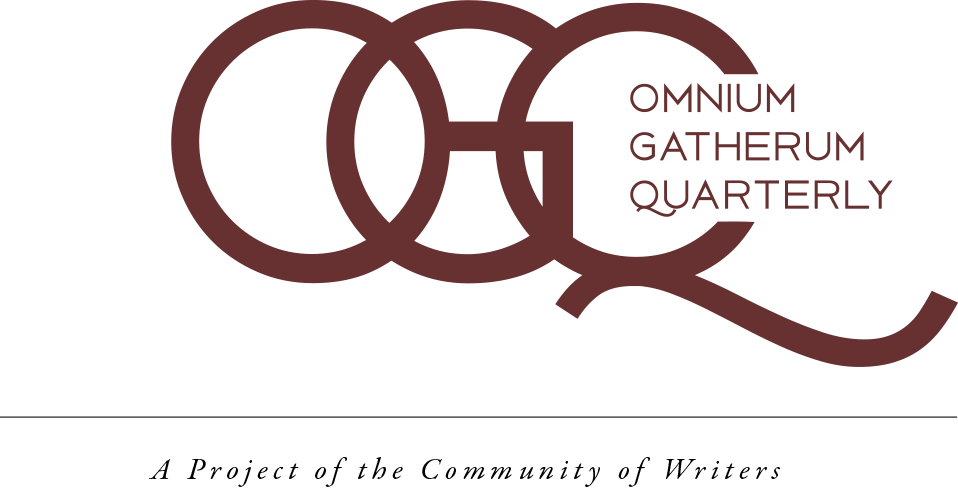Letter from the Valley
by Louis B. Jones
Fall arrives sooner at this elevation. Low-slanting sunlight is summery but sharper air comes down the canyon. Pretty much everybody has their firewood in. The 7-Eleven at the mouth of the valley has twice the usual woodpile beside the ice machine, fireplace logs shrinkwrap-bundled for the tourists and the improvident. Traffic is light on 89. Somewhere on the hillside carpenters are working on one of these pricey old plywood cabins. A Skilsaw will ring, or nail gun will bang. On the valley floor, the vast parking lot all afternoon resounds only with the clank of a flagpole lanyard or, from far away, the beep of a tractor in reverse. At Alice’s market, the cashier on his stool reads his paperback novel all day. It seems to be science fiction, judging by the cover design. And beloved, judging by how the spine is cracked and sprained.
The ski resort now has a new name, officially “Palisades Tahoe.” We can get used to that. With the passage of time, we’ll be getting the feel of whether we can be “The Palisades Tahoe Community of Writers.” Or just stick with “Community of Writers.” Change, says Heraclitus, is the only constant. Covid-19 for two years has been keeping the mass of skiers out of the valley, and us poets and writers out of the valley. That was a hard change to endure. Today a good rain is expected – always exciting, especially after this droughty summer. When the first fat raindrops hit this dust beige and fine as face powder, it sends up a cologne, an elusive scent that, of course, scientists actually have a name for. (Which, however, of course evaporates from memory the instant you learn it). Maybe an early rain foreshadows a big winter, which we all need.
October, the season to be inviting staff, negotiating and pinning down the 2022 and even 2023 contracts, in imagination cooking up next summer’s afternoons. Fundraising and plenty of deferred bookkeeping. Start calling people up, friends or just people we’ve admired from a distance, to see if they would like to come up and teach next summer. It’s a season when this particular reader can do the sort of the wide-ranging exploring there usually isn’t time for. (Al Young used to say, “Read wildly!” – his famous baritone almost pleading. That would have been a craft talk he gave, in Plaza Bar way back in the nineties.) Tessa Hadley’s new(ish) novel. Edith Wharton’s Custom of the Country, portrait of an unprincipled social-climbing woman, actually an under-the-radar feminist novel, but not quite fully conscious of itself as such. Thoreau’s Walden, again, at least bits of it. (Which is the only way I ever did read it: in bits. Maybe “in bits” is the only way it should ever be read. Lke the Bible) He’s always impressive, he and Abe Lincoln the best prose sentence-makers of that whole century. Jean Rhys’s Quartet, a downer about a woman who makes bad choices, with a most nuanced, grimy Paris background. Also, skimmed over the new edition of Limits to Growth, updated from the 1972 original. Native Son, an astonishing novel for its scarily never flinching, for its narrative drive, paced with a disregard of reader’s customary stop-to-catch-breath needs, transpiring in a POV that also breaks all rules without the reader’s noticing it or caring. For some reason, Portnoy’s Complaint (original mass-market paperback canary-yellow, bent and creased and corner-blunted) called out from the shelves of this old house. It occupied a few afternoons of August. Hard to believe this is the same author who wrote Goodbye Columbus, and the later big great novels. What was the book industry thinking? It was 1969, what was anybody thinking? A good novel revisited: Cormac McCarthy’s Cities of the Plain. Linda Spalding’s A Reckoning. James Baldwin enjoying a reprise everywhere, including here. He’s just as electrifying the second time around.
No wildfire smoke in the valley these days. Why do stars seem clearer as the nights get colder? Something involving air and optics. In Shirley Canyon there are no rapids or noisy water or even a trickle. Any pools are perfectly still and perfectly clear. The older you get, the more you think of the people who were first here, in this case the Washoe, who lived here for hundreds of years but didn’t degrade it one bit. Around the resort properties and among all the homes, in satisfaction of defensible space requirements, string-trimmers snap and whir, poking under decks and around boulders. Not everybody is complying, and the fire department guys have to go around badgering the recalcitrant ones. The sushi place has become a Mexican place, and the Cornice Cantina has finally closed: end of an era. The Cornice Cantina was where you could get two tacos and a beer for six dollars, hole-in-the-wall, hidden on the backside by the old ski-jump slope, where it was possible to hope it would never be noticed by the gentrifiers, its jukebox in the nights pumping AC/DC and Journey out over that remote stretch of parking lot. That big A-frame used to be occupied by us (the Community of Writers), back in the days when the ski corporation wasn’t paying attention and the whole valley was open to our summertime mischief, stage-plays, music, the filming of screenplay scenes. The Cornice Cantina lived its long, happy life in the room (south-facing) where I once had a workshop. The character of the valley has been somewhat changed by the pandemic. Colonists from the Bay Area. Airbnb and other impersonal relationships. Prices are up. A new conviviality seems to prevail, though. We old locals, by comparison, have a quaint slovenliness about our properties. Of course the old original skier-generation, the Austrians who came with the 1960 Olympics, and who built the resort in the days of giants – Hans and Karl and Hubie – they’re all long gone, maybe to Valhalla. While the lived, the last few used to meet in the PlumpJack bar corner in the evenings and drink their Asbach Uralt and Dortmunder, and probably gripe sotto voce about mountain management and American politics.
Aspens are turning gold. No snow patches are visible upon high. Sometimes a light dusting that melts by noon.
Interesting small turning of an epoch in history: The woman for whom Shirley Canyon was named – Shirley Scott, whose family were ranchers in this place long before skiing, and who as a girl loved wandering alone among these waterfalls and rills – died this year, age 97.
Looking forward to coming together again. For two years everything has been packed up in our storage box in Truckee, 8-by-12. The old podium, the sound systems’ amplifiers and speakers and stands, the stacks of green molded-plastic chairs, the banners and pennants and author photos and publicity clippings, what flimsy claptrap are the physical trappings of a literary life. When all this chaff blows away, think of what will remain.
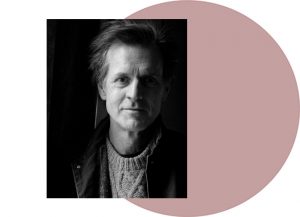 Louis B. Jones is the author of the novels Ordinary Money (Viking); Particles and Luck and California’s Over (Pantheon); Radiance and Innocence (Counterpoint). His short fiction and essays have appeared in ZYZZYVA, The Threepenny Review, Open City, The Sun, Santa Monica Review, the Pushcart Prize, and The Best of Pushcart anthology. He co-directs the Writers Workshops at the Community of Writers. www.louisbjones.com
Louis B. Jones is the author of the novels Ordinary Money (Viking); Particles and Luck and California’s Over (Pantheon); Radiance and Innocence (Counterpoint). His short fiction and essays have appeared in ZYZZYVA, The Threepenny Review, Open City, The Sun, Santa Monica Review, the Pushcart Prize, and The Best of Pushcart anthology. He co-directs the Writers Workshops at the Community of Writers. www.louisbjones.com
Letter Poetry Nonfiction Nonfiction Nonfiction Memoir

POETRY
Chimney Sweep Apprentice
(enslaved New York City Chimney sweep apprentice 1790s)
by David Mills
I’m what happens when a house breathes
out: sore, black breath in a New York throat.
Trapped caterpillar. What they think
of me—owners of these homes
and white master who hires me out
to black master sweep. Elbows, ankles
knees up zig-zag chimneys: squeeze
of heat and dusk. Soot head to toe: dirt
thick as a shirt. Palms facin’ out; stomach
up against and empty. My days a brick
wide and a brick and a half long: I could
die here. But brush above my head
I chuck soot; chip tar wit’ a scraper;
black rain pepperin’ my neck, hot rim
of my eyes. Filth to the sides of flues,
mazes sticky with poison, hearth
to cap damper. Started prenticin’
when I was six. Now
eighteen. Flesh leathery. Ankles
swelled to black apples. Growin’:
a stunt. Can’t say which is better:
cramped heat or winter’s chill.
My cry—Soot-O, Weep, Weep! —
on the street or pinched in the flue.
My life up in nothin’ but smoke.
Which, Too/Split Flash: Break
(About either Sarah or Abigail, enslaved New Yorkers who participated in the 1712 slave revolt were captured, jailed and—after giving birth—hung.)
In a pinched and dank corner cell at the corner
of Wall and Broad, beneath rulings and arches:
four dials on a clock, beneath arguments and archives: petit juries and supreme courts, beneath
criers and bailiffs: peals and flutters, beneath bells and constables and birds and cupolas, beneath
perches and deputies: whipping posts and small talk, beneath windows and guilt: wainscot
and lawyers, beneath deep thought and bench wigs: warrants and decorum, beneath two floors
and black robes: conviction and handwringing, beneath plaintiffs and gavels: punishment
and appeal, beneath charge and indictment a hung head’s arrest, beneath a trial and its rumors
before acquittal and pardon there’s a case and its verdict/no interrogation or constitution before
a judge and one’s peers, between wrongdoing and wrong done and who’s right and what’s
wrong, beneath sentences and pillory, evidence and stairwells:: The City Hall dungeon, where
in darkness lies a woman with child. So, no question of where the labor. But when labor/what
labor—slave? slave—who labor even in labor. Sarah? Abigail? Which is dying to lie on her left
side—shackled to staples with staples affixed to history: stone slaves once quarried to build
a wall boiled down to a street. Which one’s water break? Which one gush or trickle: damp
to the woolsey, sweet to the nose? How hard? When tender? Abdomen. When hard? How
tender? Uterus. Ache—how dull? Shackled to the… stapled to the… bolted to the agony: stone
slaves once used to build…pressure: pelvis: how long? When is during between? What
is between (en) during? The stench of a Necessary tub? Contractions? Waves: water’s pushy
guests. 45 seconds (or so). Which one’s still talking? Maybe one… shackled to the… stapled
to the… bolted to the… memory: stone slaves once used… Maybe 15 minutes later. Maybe one.
Maybe a minute (or) two later. or half a minute longer. stretch marks. silence. Which one’s
stomach’s a punch? Clenched. A fist. Breathe. Into the lower back, into the ache. Knowing you
got not even a sip of say-so over your captors’ shoe music echoing on the floor above you
shackled to the …stapled to the…bolted to these echoes.
Mercy
Indeed, I tremble for my country when I reflect that G-d is just.
—Thomas Jefferson
Along the city’s jawline by
the wharf where a peck of slaves
were auctioned, Claus might have
heard tell how Robin sunk a penny-
knife into the conch below his
owner’s shoulder. Now barefoot
he is stripped to the waist, spread-
eagle, bound to a wagon wheele:
spokes versed in grass and its green
obedience; mud’s scorched metamorphosis;
the way snow delivers news piecemeal
from the heavens. Limbs stretched
slowly rotated on that wheel, Claus
absorbs the dust, the turns, the deliveries:
each journey’s leg and arm. Executioners
seldom traffic in compassion;
this one punishes Claus “bottom
up.” First a sledgehammer rains
on his shins—Jesus have mercy, he
screams and rotates—until they snap
between gaps of the wheel;
a wooden cudgel sings
to his kneecaps—he howls
rotates— ‘til they shatter …
Even the chalky, taunting throng
winces. Then the thunder of an iron
bar’s administered to his forearms
—he shrieks, rotates— ‘til they’re smashed….
The elbows/the chest/the endless bone-
cracking caught a quarter mile off. Until,
against G-d’s own architecture, each
limb dips like a fractured hammock.
On the Commons between Broadway
and Kip, the wheel’s nailed high on a pole.
Sparrow-hawks peck at the broken body.
For four days—for likely only having
offered Robin a penny-knife or shelter
in the wee hours of an April morn—
he is bloody billowing laundry
only death has the stomach to dry.
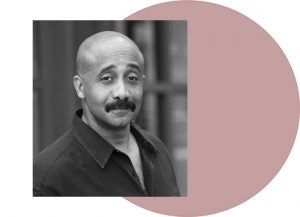 David Mills holds an MFA from Warren Wilson College. He’s published four collections: The Dream Detective, The Sudden Country, After Mistic (Massachusetts slavery poems) and the bestselling Boneyarn (New York slavery poems). His poems have appeared in Ploughshares, Brooklyn Rail, Colorado Review, Crab Orchard Review Jubilat, Callaloo, Obsidian, The Common, and Fence. He has also received fellowships from the New York Foundation for the Arts, Breadloaf and The American Antiquarian Society. He lived in Langston Hughes’ landmark Harlem home for three years and wrote the audio script for Macarthur-Genius-Award Winner Deborah Willis’ curated exhibition: Reflections in Black: 100 Years of Black Photography. The Juilliard School of Drama commissioned and produced a play by Mr. Mills. He has recorded his poetry on ESPN, RCA Records and for the National Parks Service. He has also had poems displayed at the Venice Biennale and Germany’s Documenta art exhibition.
David Mills holds an MFA from Warren Wilson College. He’s published four collections: The Dream Detective, The Sudden Country, After Mistic (Massachusetts slavery poems) and the bestselling Boneyarn (New York slavery poems). His poems have appeared in Ploughshares, Brooklyn Rail, Colorado Review, Crab Orchard Review Jubilat, Callaloo, Obsidian, The Common, and Fence. He has also received fellowships from the New York Foundation for the Arts, Breadloaf and The American Antiquarian Society. He lived in Langston Hughes’ landmark Harlem home for three years and wrote the audio script for Macarthur-Genius-Award Winner Deborah Willis’ curated exhibition: Reflections in Black: 100 Years of Black Photography. The Juilliard School of Drama commissioned and produced a play by Mr. Mills. He has recorded his poetry on ESPN, RCA Records and for the National Parks Service. He has also had poems displayed at the Venice Biennale and Germany’s Documenta art exhibition.
Letter Poetry Nonfiction Nonfiction Nonfiction Memoir

NONFICTION
Change Order
by Kate Nason
definition:
a written alteration to a previously signed contract for work.
As a young girl, I had a recurring vision of myself, an old woman, living in a little house—a shack really—with a view of the ocean, the beach just steps away. It was the sand on the floor that never needed sweeping, unless I wanted to sweep, that was the hallmark of this life I envisioned in a distant future, one possessed by the old woman I would someday be.
I am that old woman now and just this morning, I walked down the hall from our little front room, dawn flooding the wide windows at my back, past the front door, sand like spilt sugar, making its scritchy sound beneath my slippers. Maybe I’ll sweep today, I thought. And then, I wondered as I always do, did I conjure this life in this house on the edge of the sea? Had I manifested it? Or did I know?
Here’s another. That same young girl always imagined herself a mother with two young children. Never a man in the picture. That I would become a single mother of two, two marriages failing in rapid succession, endings brought about by occurrences I could not imagine nor wish for anyone. Again, was this prescience or had I manifested these eventualities with my childhood visualizations?
Looking back, I’ve always had a sixth sense—an intuition. Dreams hinting at oncoming disasters, waking visions, inner knowing. I’ll admit, before I knew what it was or trusted it, I did not always heed this faithful partner. Those two marriages? Proof.
As an angsty teen, I would sit on the rocks at the edge of Monterey Bay and imagine I’d like to die in the ocean. I was at 17, mildly depressive, and found a certain romance in being swept out to sea, caught in her tides, like the arms of a lover, dashed against her rocks.
So, here’s my question. The fact that I now live in that house with sand on the floor, sitting as I do at our dining table, where I write, watching the waves crash against craggy rocks studding the sand, should the fact this house sits squarely in a tsunami evacuation zone concern me? Will the ocean, my love of her, my teenage fantasy of dying in her arms, be the end of me?
Hang on, I’d like to cultivate another ending. I will die much older, in my bed, legs tangled in sandy sheets, eyes full of ocean, her voice a roar through the open windows, curtains billowing in her breeze.
I hereby issue a change order.
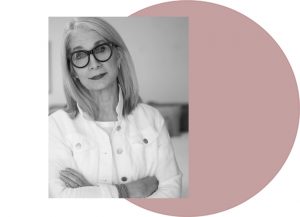 Kate Nason is the author of Everything Is Perfect, a memoir. She lives in Portland, Oregon, where she’s working on her second book, also a memoir, titled La Bugiarda (the Liar), about her great-grandmother’s fictitious ancestry.
Kate Nason is the author of Everything Is Perfect, a memoir. She lives in Portland, Oregon, where she’s working on her second book, also a memoir, titled La Bugiarda (the Liar), about her great-grandmother’s fictitious ancestry.
Letter Poetry Nonfiction Nonfiction Nonfiction Memoir

NONFICTION
Essential Work
by Monica West
Pandemic time unspools like thread falling to the floor—its monochromatic fibers blend into the carpet that surrounds it. As time marches on, it becomes harder to distinguish one day from another. Is it Wednesday or Saturday? As the tasks of one day bleed into the next, each day is a parade of misery and mundanity.
Inconceivable global death numbers climb as the pandemic rages. From Italy, Spain, and New York City, we see footage of empty streets, refrigerated container trucks storing bodies, and hospital workers mummified in PPE. News outlets flash graphs of 21-day spikes while governors talk about flattening the curve, wearing masks, and social distancing. And then there are the televised sounds of people who have lost loved ones: their plaintive screaming sounds like their souls are being ripped from their bodies.
There is so much noise.
From my Oakland home, the continuous Doppler effect of sirens blends into the ambient noise of life happening in nearby apartments. Protests about the murders of Ahmaud Arbery, George Floyd, Breonna Taylor, and others march through surrounding streets. Their muffled, masked voices reach a fever pitch as they shout “No justice, no peace” and “Black lives matter.” At night the noises are different: rubber bullets, flashbangs, and teargas canisters hiss in the darkness. They are reminders of life going on outside, in a country driven to its knees by racial injustice. Yet, simultaneously, there is stillness, silence. Streets that teemed with people and cars are cloaked in a ghastly quiet, planes that streaked the sky overhead are infrequent at best, and life in my house has slowed to a standstill.
It is a maddening dissonance.
There has always been noise in my head—characters speak to one another and to me, storylines reveal themselves as though on a constant audible loop. The noise is a curling finger that beckons me. When I finally get close enough, puffs of breath warm my face as it whispers in my ear. I have something to tell you. And I always listen, always do what it says. During the pandemic, however, the voice has become inaudible. It is getting drowned out by the other sounds.
Creation is my way through a world that I don’t understand; when I am writing, I create a narrative that cuts through the surrounding chaos. I control characters, plot narratives, and resolve conflicts. In a world that is ever spiraling, it gives me a false sense of power. I have written through wars, national scandals, natural disasters, and mass shootings. But for the first time in my life, in the face of astronomical death tolls, shutdowns, racial unrest, and quarantines, creation feels impossible. Writing a novel feels like an impotent and frivolous way to cope with suffering while essential workers rush off to save lives. My mind buzzes with questions about the importance of my vocation: What is the place for creation in a world of destruction? What is my role as an artist when people are dying all around me?
As creatives, we write novels, make art, record music, and direct films. In our medium of choice, we see the unseen, capture the beauty that people often miss, and craft something that didn’t exist beforehand. In a country where traditional schooling has reinforced ideas that arts education is supplemental instead of core, we have learned to think of art as a hobby, of writing as a pastime, of music as a thing to engage in when academic subjects have been completed. But creation is not frivolity. We make cultural records. We chronicle what it feels to live in these times. We help people remember what it was like to live in other times. Through creating, we connect people back to themselves and what is important.
When the world stopped, some things didn’t. Trapped in their homes, people binged television shows, read books, played music over dinner, and danced. They watched orchestras perform on Zoom, streamed the latest film release, and visited virtual museum exhibits. All of these activities were made possible by people who believed that creation was imperative.
As the pandemic stretches on, I return to my questions. What is the place for creation in a world of destruction? What is my role as an artist when people are dying all around me? During the past year and a half, I have learned that art—both its creation and consumption—is mandatory during difficult times. Creation allows people a glimpse of possibility, and that has been in short supply during a pandemic. And so, during a pandemic, I write. I create. It is one of the most important things that I can do at a time like this. In fact, it is essential work.
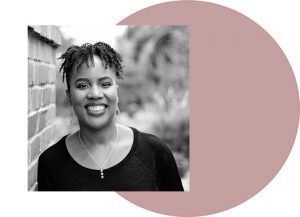 Monica West is the author of the debut novel Revival Season, published by Simon & Schuster in May, 2021. She earned a B.A. in English Literature from Duke University, an M.A. in English and American Literature from New York University, and an MFA in Fiction Writing from the Iowa Writers’ Workshop where she was also a Rona Jaffe Graduate Fellow. She has received a fellowship from Kimbilio Fiction, and she will be a Hedgebrook Writer-in-Residence in Summer 2022. She lives in Oakland, California.
Monica West is the author of the debut novel Revival Season, published by Simon & Schuster in May, 2021. She earned a B.A. in English Literature from Duke University, an M.A. in English and American Literature from New York University, and an MFA in Fiction Writing from the Iowa Writers’ Workshop where she was also a Rona Jaffe Graduate Fellow. She has received a fellowship from Kimbilio Fiction, and she will be a Hedgebrook Writer-in-Residence in Summer 2022. She lives in Oakland, California.
NONFICTION
I Got a Booster Shot (And I Have Some Feels)
by Martina Clark
Yesterday, my feels and I went for a COVID-19 vaccine booster shot. And it was fine. The pharmacist who administered it correctly placed the Walgreen’s bandage upside down in recognition of my name starting with M. I got the shot, my M Badge, waited the requisite fifteen minutes, and headed on my way. My arm is sore but, so far, so good.
On the CDC list of who is approved early, I tick the box for being immunocompromised. Nearly thirty years and counting with HIV. The pharmacist, even before he presented me with my individualized M Badge, commended me for being proactive about my health. Suggested I follow up with a flu shot in a few weeks. Mumbled to himself, Thirty years. Hmm.
Many of my friends, also long-term survivors of various things, have received their booster shots. I know with absolute certainty that my family and loved ones would encourage and applaud my seeking out this medical intervention.
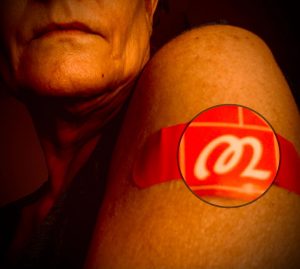
I am now super-duper-totally-fully vaccinated against COVID-19. And that is a good thing. I had COVID-19 in late March of 2020. I’m an early adapter. And it was awful. I’m lucky enough to still be here to tell the story of how dreadful it was, so it wasn’t as bad as many cases. But I would not wish it on anyone and now–a year and a half later–I am still dealing with the long-haul effects.
I’ve had a headache for eighteen months. Nobody can figure out why. I have a gremlin living in my chest. Nobody can figure out why, where it came from, or how to evict its sorry ass. My left eye is still reconstituting itself following surgery in March of this year to remove an epiretinal membrane, also known as a macular pucker, likely caused by inflammation from COVID. (See above reference to headache.) It was distorting my vision. And while the surgery was a success and I’m healing as expected, my left eye is still not what it was in February of 2020. This thing is real. And it is horrendous.
And yet, part of me feels very selfish and guilty. As a former public health worker, I am acutely aware of the inequities of access to care in so many countries around the world, not to mention so many communities here in the USA. It infuriates me when I hear stories of COVID vaccine doses being thrown away because there is not enough demand for even the first shot. While I’m happy–very happy–to debate our right to choices regarding our bodies, these choices to choose horse dewormers, bleach, or whatever not-a-vaccine trend is in style today over a proven vaccine make me want to smash things. The science behind the mRNA Pfizer and Moderna vaccines has been in the works for decades. It was not magically created out of thin air overnight. The work of researchers was simply put into action and it works. As is often the case, like it was with HIV, science adapts more quickly than society.
This is where my feels kick in. Who am I to get a booster, a third dose, when so many in the world cannot even get one shot? What makes me so special? So extra worthy? Not. A. Damn. Thing.
My partner then reminds me that I am not in control of global vaccine distribution. No matter my feelings on the matter, whether or not I get a vaccine is not going to provide a shot to someone somewhere else. The point can also be made that we each have a responsibility to ensure we don’t inadvertently transmit the virus to others, so increasing my own protection, in turn, protects others.
When I was a little girl, my older siblings rotated through the task of making sure I finished my food, drank my milk, ate my vegetables, and so on. When it was my eldest brother’s turn, he’d sit next to me and pull out an envelope. He’d lecture me on the fact that there were children starving in _____ (fill in the blank, he had a long list of places) and that for me to not eat my meal was shameful when others didn’t have the opportunity to eat anything. If that didn’t work, and there was a 50-50 chance that it would on any given day, he’d say that if I didn’t finish my food he’d put it in the envelope and send it to some kid in _____ (fill in the blank). Often he’d show me a map, explaining the distances involved. Then we’d discuss whether or not the food would be edible after its journey through the postal system. (And that was before Postmaster DeJoy, but that is for another essay.) We’d agree that it would not keep so I’d better just eat it. And, most of the time, I would because I’d feel guilty, knowing that other children went hungry.
Perhaps he instilled in me the importance of caring about others or my responsibility to appreciate what I had. Or maybe it was just a clever devise he had to get his baby sister to eat so he could get on with his life. Whatever it was, it sticks with me to this day, more than fifty years later.
Alone, I cannot solve the COVID-19 pandemic. But I can, at least, look after myself and those around me to ensure I don’t contribute to the further spread of this terrible, awful, horrendous disease.
So, I got my third shot because I know my body needs the extra help. And I was awarded my personalized M Badge. And today my arm hurts so I’ll think about this until it stops, and probably long afterwards. I’m so, so so so, very lucky to have access to the vaccine and that it is free and will very likely keep me from dying from COVID in years to come. I survived my first bout with COVID-19, Alpha Edition. Not sure how I’d do with Delta. Mu, just move over, you can’t have my M Badge. Go away. And Lambda, you too, get lost.
Please get vaccinated.
Protect yourself and those you love and even those you don’t love or even know. For the love of humanity, do your part. The life you save might well be your own.
And then, vote in elected officials who respect science and understand the importance of helping other nations because until we do, this pandemic will never end. And, eventually, once this pandemic does end, we have to fight like hell to end the health and wage gaps here and abroad by dismantling, then rebuilding, the systems that perpetuate so many injustices. The real work is just beginning.
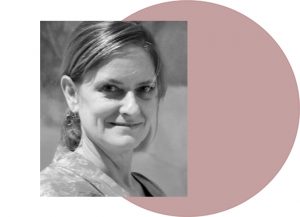 Martina Clark has written for The Southampton Review, The Manifest-Station, Lowestoft Chronicle, and Panorama: The Journal of Intelligent Travel, among others, and in 2014 she won Silver for Funny Travel in the SOLAS Awards for Best Travel Writing. She holds a BA in International Relations from San Francisco State University and an MFA in Creative Writing and Literature from Stony Brook University and writes memoir, personal essays, and travel narratives. She worked for the United Nations system (including UNAIDS, UNICEF, and the Department of Peace Operations) for two decades and now teaches writing, critical reading, and global politics through the College Now program at LaGuardia Community College for CUNY. She has been living with HIV for more than half her life – 29 years and counting – and survived COVID-19 in 2020. Martina has traveled to more than 90 countries and conducted condom demonstrations in at least 50 of them. She’s traveled by boat, bus, and plane, but never by elephant or camel. My Unexpected Life: An International Memoir of Two Pandemics, HIV and COVID-19, Martina’s first book, is now available everywhere.
Martina Clark has written for The Southampton Review, The Manifest-Station, Lowestoft Chronicle, and Panorama: The Journal of Intelligent Travel, among others, and in 2014 she won Silver for Funny Travel in the SOLAS Awards for Best Travel Writing. She holds a BA in International Relations from San Francisco State University and an MFA in Creative Writing and Literature from Stony Brook University and writes memoir, personal essays, and travel narratives. She worked for the United Nations system (including UNAIDS, UNICEF, and the Department of Peace Operations) for two decades and now teaches writing, critical reading, and global politics through the College Now program at LaGuardia Community College for CUNY. She has been living with HIV for more than half her life – 29 years and counting – and survived COVID-19 in 2020. Martina has traveled to more than 90 countries and conducted condom demonstrations in at least 50 of them. She’s traveled by boat, bus, and plane, but never by elephant or camel. My Unexpected Life: An International Memoir of Two Pandemics, HIV and COVID-19, Martina’s first book, is now available everywhere.
Letter Poetry Nonfiction Nonfiction Nonfiction Memoir

MEMOIR EXCERPT
Solace in Repose: from Our Last Blue Moon
by Kris O’Shee
For the third night, I wasn’t able to sleep. I was already drained from the previous week I had spent in Sacramento taking care of my ninety-year-old mother and my stepfather. Any other summer I would have joined Alan for the workshops in Olympic Valley, but torn between being a good daughter and a good wife, I had chosen to be with my parents. They’re old, I told myself. Alan will be fine.
Only Alan wasn’t fine. He’d told me about passing a kidney stone. I should have left Sacramento and gone to him when I’d heard the fatigue in his voice.
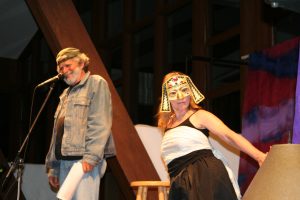 In the promotional video Alan had taped, he began by saying, “Olympic Valley is a home away from home.” He leaned back on the wooden bench under a fluttering aspen, the camera catching the softness of his eyes, even behind the eyeglasses he wore, the kind that darken when exposed to sunlight. He would speak serenely about the Community of Writers, the quality of the staff and students, and his admiration for Oakley Hall, its founder, and the Hall family, whose devotion to the art and craft of writing had kept the workshops going for over forty years.
In the promotional video Alan had taped, he began by saying, “Olympic Valley is a home away from home.” He leaned back on the wooden bench under a fluttering aspen, the camera catching the softness of his eyes, even behind the eyeglasses he wore, the kind that darken when exposed to sunlight. He would speak serenely about the Community of Writers, the quality of the staff and students, and his admiration for Oakley Hall, its founder, and the Hall family, whose devotion to the art and craft of writing had kept the workshops going for over forty years.
As I lay in bed, I imagined Alan driving out of the parking lot at Olympic Valley Village after his interview. Colorful national flags line the walkways there, remnants of the 1960 Olympics. Eager tourists, crowding the fancy boutiques and souvenir shops, lick at ice cream cones, waiting for the next tram to take them to the top of the mountain. Over the years, the village has acquired a Disney-like quality, becoming as much a summer as a winter destination. Leaving the village, Alan would drive past the horse stables, remembering his daughters, ponytails bouncing as they rode the spotted ponies through the grassy meadows. After their parents’ divorce, every August they would come from Albany where they lived with their mother and her partner to stay with their father while he was in California.
Perhaps, leaving the valley, he thought back to the first summer we had met, the summer when he introduced me to his daughters, then ten and twelve years old, and how all of us drove up to Olympic Valley together from Santa Cruz, the girls and me feeling instant affection for one another. How easily the four of us strolled, hand in hand, across the village parking lot on a fine sunny day. A woman approached us in full earnestness. “You all look so happy. Are you an Esalen family?” she asked, referring to the institute and retreat center in Big Sur.
How hard we all laughed! This “family” had been assembled out of so many broken parts, including my own. Each of my parents had had three spouses, with offspring from each marriage, and soon I would become Alan’s third wife. At least I didn’t have children, which made it less complicated, but I could empathize with Alan’s kids, and with Alan. As the years went on, Alan reached a level of contentment thinking of his children, how they had grown into such splendid adults with great hearts and minds despite, as he saw it, the pain he felt he had caused them—marrying, divorcing, marrying, divorcing, marrying.
I was sure, as Alan drove out through the gate marked Olympic Valley, that he felt a tinge of sadness saying goodbye to another summer, the friendships he had formed over the years, especially with fellow writers James D. Houston and Al Young. They loved to jam together, Jim plucking and thumping on his bass, Alan improvising either on the piano or using his voice to scat to melodies Jim threw out. Al played his credit card like it was a kazoo. Their frequent songs were “Route 66” and “Straighten Up and Fly Right.” Houston, the author of Bird of Another Heaven and A Queen’s Journey, among other works, died in Santa Cruz in 2009. He was another brother of choice for Alan, and the pain of his death was gnawing. The workshops had never been the same without him. His wry wit and penchant for storytelling could send Alan into spasms of laughter.
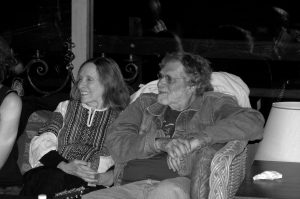 Soon after Jim’s death, he appeared in a vision to Alan, hovering over the waters of the lagoon near Jim’s house in Santa Cruz, the roar of the ocean only a short distance away. Alan told me about it. He reported calling out, “I miss you, man. What’s it like, this new place in the universe?”
Soon after Jim’s death, he appeared in a vision to Alan, hovering over the waters of the lagoon near Jim’s house in Santa Cruz, the roar of the ocean only a short distance away. Alan told me about it. He reported calling out, “I miss you, man. What’s it like, this new place in the universe?”
“Well, Alan,” Jim responded, his eyes twinkling, “a gig is a gig.” How they laughed and laughed until Jim’s face disappeared into the shimmering light. In that moment, Alan shook in grief, fearing his own death, fearing the loss of everything he knew and loved. And shook to think of Jim dying while still working on a novel, in Alan’s view the worst fate that could befall a writer. Jim’s last novel, A Queen’s Journey, was published posthumously in 2011.
So as Alan drove, there would have been no stopping him. He turned onto the detour road to Tahoe City, where he quickly purchased a few grocery items and some vitamins at New Moon Natural Foods before driving to Highway 89. Leaving the valley, leaving Lake Tahoe, leaving Truckee, then on to Highway 80, winding through Donner Pass, each moment of the descent letting him feel his lungs expand. Making him hope, as he had each summer for the last thirty-five years, that once he had tasted the sweet salt air of the Pacific, once he had set his eyes on the distant horizon, the words would come.
The words would swell up in him like the dizzying tides of his beloved ocean.
He would finish his novel.
He could not get to Santa Cruz fast enough.
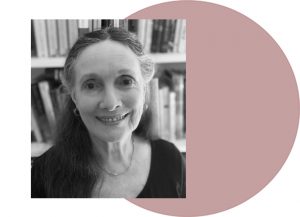 Kris O’Shee spent four decades as a modern dancer and choreographer, including a decade in London, where she cofounded Junction Dance Company and taught at the London Contemporary Dance School. After returning to the US, she taught and performed in the San Francisco Bay Area before taking a position on the dance faculty at Sam Houston State University in Huntsville, Texas. She then moved to Washington, DC, to live with her husband, Alan Cheuse, and founded O’Shee Dances, through which she continued choreographing and performing. In the last two decades, O’Shee earned a certificate in massage therapy and a graduate degree in psychology. She currently has a private practice in psychotherapy in DC, where she resides. Our Last Blue Moon, a memoir, is her first book.
Kris O’Shee spent four decades as a modern dancer and choreographer, including a decade in London, where she cofounded Junction Dance Company and taught at the London Contemporary Dance School. After returning to the US, she taught and performed in the San Francisco Bay Area before taking a position on the dance faculty at Sam Houston State University in Huntsville, Texas. She then moved to Washington, DC, to live with her husband, Alan Cheuse, and founded O’Shee Dances, through which she continued choreographing and performing. In the last two decades, O’Shee earned a certificate in massage therapy and a graduate degree in psychology. She currently has a private practice in psychotherapy in DC, where she resides. Our Last Blue Moon, a memoir, is her first book.
Letter Poetry Nonfiction Nonfiction Nonfiction Memoir

Editor’s Note
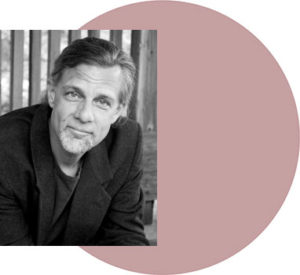
The fall issue of our online, in-house, invitation-only, COVID-era quarterly Community of Writers journal arrives, as you will note, with a lot of adjectival explanation. Fortunately, the writing once again lives up to the hype, with poetry and prose which runs the gamut. Running the gamut has been a marathon lately, as reflected in personal, political, meditative if reliably artful offerings from this issue’s contributors: poet David Mills, novelist Monica West and nonfiction writers Martina Clark and Kate Nason. Dear friend Kris O’Shee shares an excerpt from her memoir about life and love with longtime staffer Alan Cheuse (1940-2015), with archival photos by Brett Hall Jones and Tracy Hall. Fiction Co-Director Louis B. Jones starts us off with a seasonal report from the actual Valley. I hope you are delighted, inspired, and affirmed by exemplary work from your Community of Writers pals, whether you’ve met them in real life at the conference or not.
Andrew Tonkovich
Editor, OGQ
ABOUT THE OGQ
Omnium Gatherum Quarterly (OGQ) is an invitational online quarterly magazine of prose and poetry, founded in 2019 as part of the 50th Anniversary of the Community of Writers. OGQ seeks to feature works first written in, found during, or inspired by the week in the valley. Only work selected from our alums and teaching staff will appear here. Conceived and edited by Andrew Tonkovich. Submissions will not be considered.
